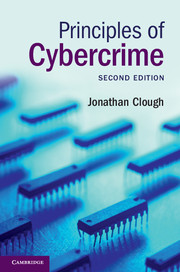Book contents
- Frontmatter
- Contents
- Preface
- Acknowledgements
- Table of Legislation
- Table of Cases
- List of abbreviations
- Part I Introduction
- 1 Cybercrime
- Part II Computer as target
- Part III Fraud and related offences
- Part IV Content-related offences
- Part V Offences against the person
- Part VI Jurisdiction
- Bibliography
- Index
1 - Cybercrime
from Part I - Introduction
Published online by Cambridge University Press: 05 October 2015
- Frontmatter
- Contents
- Preface
- Acknowledgements
- Table of Legislation
- Table of Cases
- List of abbreviations
- Part I Introduction
- 1 Cybercrime
- Part II Computer as target
- Part III Fraud and related offences
- Part IV Content-related offences
- Part V Offences against the person
- Part VI Jurisdiction
- Bibliography
- Index
Summary
The evolution of cybercrime
Technology … is a queer thing. It brings you great gifts with one hand, and it stabs you in the back with the other.
In October 2014, Estonian national Sergei Tšurikov was sentenced to eleven years in prison in the United States for his part in a conspiracy which resulted in the loss of over US$9.4 million. The offences occurred during 2008 when Tšurikov and others were able to hack into the computer network of RBS WorldPay. In what authorities described as ‘perhaps one of the most sophisticated and organized computer fraud attacks ever conducted’, the offenders were able to compromise the data encryption used by RBS and raise the account limits on ‘payroll debit cards’. They then provided a network of ‘cashers’ with forty-four counterfeit payroll debit cards that, in under twelve hours, were used to withdraw ‘more than $9 million from over 2,100 automatic teller machines (ATMs) in at least 280 cities worldwide, including cities in the United States, Russia, Ukraine, Estonia, Italy, Hong Kong, Japan and Canada’. Adding insult to injury, Tšurikov and another hacker were able to monitor the withdrawals in real time using RBS’ computer systems.
Although a highly sophisticated example, this case illustrates many of the features and challenges of modern cybercrimes; it was organised, financially motivated, technologically sophisticated and transnational. It was also made possible by the ubiquity of digital technology in modern life; technology that has transformed the way in which we socialise and do business. While overwhelmingly positive, there is also a dark side to this transformation. Proving the maxim that crime follows opportunity, virtually every advance has been accompanied by a corresponding niche to be exploited for criminal purposes.
The magic of digital cameras and the sharing of photographs is exploited by child pornographers. The convenience of electronic banking and online sales provides fertile ground for fraud. Electronic communications and social networking sites may be used to stalk and harass. The ease with which digital media may be shared has led to an explosion in copyright infringement. Our increasing dependence on computers and digital networks makes the technology itself a tempting target; either for the gaining of information or as a means of causing disruption and damage.
- Type
- Chapter
- Information
- Principles of Cybercrime , pp. 3 - 28Publisher: Cambridge University PressPrint publication year: 2015
- 1
- Cited by



